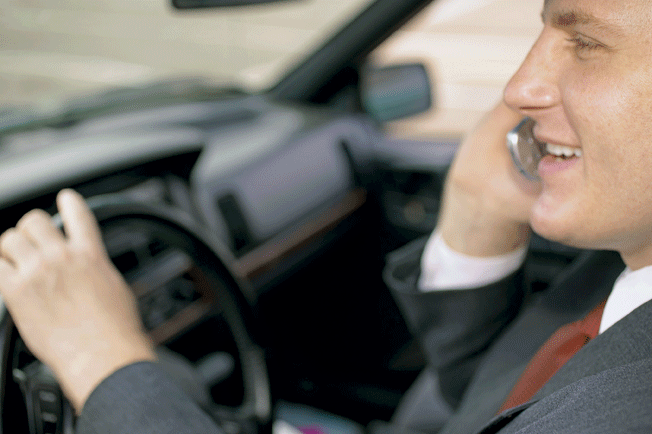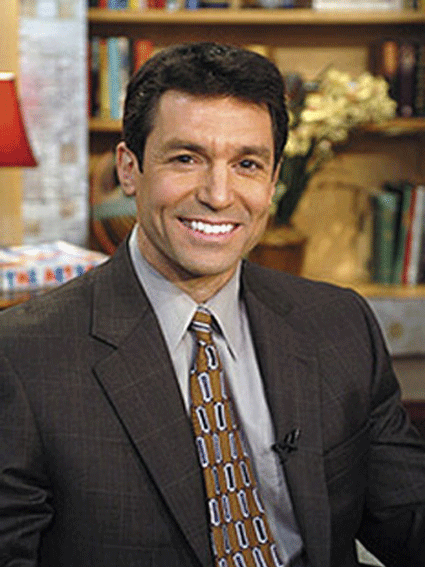
Diet and Health
Health Threats
Convenient Perils

Driving while under the influence of cell phones presents a risk that may prompt an all-out ban.
But the real problem with governance in health matters is we ourselves.
 |
By: Dr. David L. Katz* |
There is at times peril in convenience. Or maybe there is convenience in peril. Either way, we have some choices to make.
My preoccupation with this notion is courtesy of two topics recently in the news, and kindled by invitations to discuss them both on national television. Fox News had me on to talk about the hazards of cell phone use while driving; CNN asked me to talk about the dangers of germs on the scrubs worn by hospital workers.
Both of these topics present rather straightforward hazards, with equally straightforward solutions. If cell phone use while driving is dangerous, we could just stop doing it. If scrubs carry germs, wearing scrubs outside the hospital could, and should stop.
The trouble, however, with these seemingly simple solutions is that they are at odds with human nature. We will inconvenience ourselves to avoid an imminent danger -- such as undergoing coronary bypass surgery to avoid death from a heart attack. But when dangers are remote or theoretical, we cling to the convenient. Examples are innumerable.
Driving too fast increases the risk of crashes, injury and death. But in the hopes that none of the state troopers who prowl the highways I routinely travel read this column, I confess that I speed. I am always in a hurry, and more often than not late. The risk of a car crash is remote -- the convenience of getting where I’m going fast is clear, real and immediate.
Smoking kills. But it kills slowly. If any single cigarette were an act of acute suicide, there would be a lot fewer smokers. But because the gratification is immediate, the risk generally remote -- at least remote from each isolated act of smoking -- a lot of people still do smoke.
Lack of exercise is an indirect cause of both chronic disease and premature death; but forgoing exercise today may be very convenient. Making time to exercise may be quite the contrary. And so, we are a sedentary society.
If you apply your imagination to the topic for a moment, I’m confident you’ll have no trouble generating a much longer list. We routinely pay for convenience with some increased risk of personal harm.
Let’s revisit the topics I covered this past week. The National Safety Council is calling for an all-out ban of cell phone use while driving; hands free phones included. This position is predicated on data showing clearly that cell phone use is a common cause of car crashes.
Of course, we might simply encourage people to avoid cell phone use while driving. But that would require people to prioritize the theoretical benefit of avoiding a car crash over the actual convenience of fitting in a call. Our abundant experience with human nature -- our own and everyone else’s -- tells us this is a long shot. Hence, the proposed ban.
During long drives to speaking engagements, I routinely have a whole series of conference calls. I would find it terribly inconvenient to give these up. But that doesn’t mean I shouldn’t.
Data are dispassionate, and collected in an unbiased manner, they tell us what we should know whether or not it’s the answer we wanted. My view is that epidemiology should trump ideology in the development of public policy. If epidemiologic data indicate more crashes, more injuries, more deaths with even hands free cell phone use while driving -- a ban should, perhaps, at least be considered.
As for germy hospital scrubs, the issue has slippery slope written all over it. If scrubs worn in and out of hospitals can transmit germs, so can any other garment. Policies that preclude wearing scrubs home would not preclude germ transmission by the business suits of attending physicians. Nor, for that matter, by the civvies of every family member or friend visiting a loved one.
So, in fact, the only policy that would really fix this problem is a requirement that everybody frequenting a hospital change their clothes as they enter, and leave. Sounds rather ... inconvenient, doesn’t it?
Which leads me to the conclusion that the avoidance of peril and the embrace of convenience must be reconciled. And that means solutions based in engineering or technology, rather than either intrusions by Big Brother, or pie-in-the-sky hope that we’ll all just do the right thing. Human behavior could prevent almost all car crashes -- but since that’s not happening any time soon, thank goodness for seat belts, air bags, crumple zones and safety cages. Thank goodness, in other words, for engineering that saves us from ourselves!
Maybe we can keep our handsfree cell phones but use them in cars designed with motion sensors that indicate when we are drifting out of our lane, or other safety features that preserve convenience, but whittle away the peril to an irreducible minimum. Perhaps, if we need to disinfect clothes at the thresholds of our hospitals, we can pass under a curtain of UV light that does the job for us.
Our faults, and vulnerabilities generally lie not so much in our stars -- as in ourselves. But our selves, alas, may be the hardest thing of all to change. So while we may look to our selves for the sources of many problems, we may need to look to the star engineers and innovators among us for the breakthrough solutions. Engineered solutions that banish peril, but preserve conveniences we have come to think of as our right. We should welcome the data that tell us where best to direct these efforts.
* Dr. David L. Katz is an Adjunct Associate Professor of Public Health
and Director of the Prevention Research Center at the Yale University School of Medicine.
He is and Editorial Advisor to Prevention Magazine, Columnist for O, the Oprah Magazine,
and a Medical Consultant to ABC News. He may be reached at www.davidkatzmd.com.